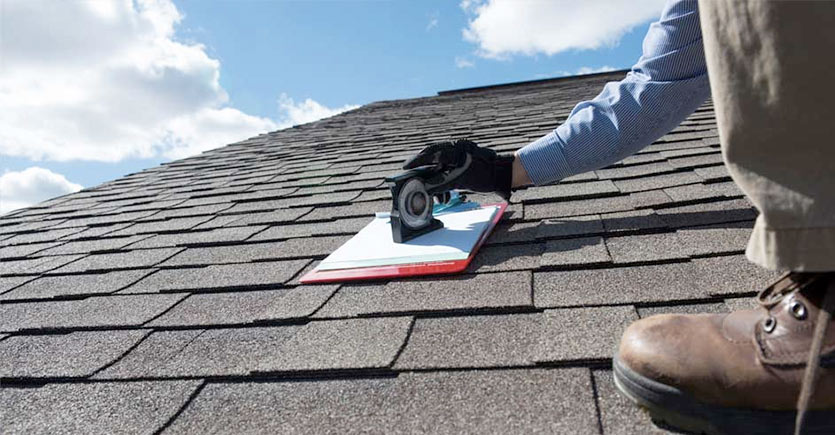Work with an professional Toledo Roofer for residential roofing projects.
Work with an professional Toledo Roofer for residential roofing projects.
Blog Article
How to Evaluate Different Roof Choices for Your Building Needs
Assessing roofing options for your building needs a comprehensive method that takes into consideration different factors such as the intended use the structure, neighborhood climate problems, and product features. It is necessary to weigh the benefits and disadvantages of various roofing kinds, from asphalt tiles to metal and clay ceramic tiles, while likewise considering preliminary expenses and long-term maintenance. In addition, understanding energy efficiency and visual charm can affect your choice. As you ponder these considerations, one concern stays: which factors will ultimately direct your choice for a lasting and visually pleasing roof remedy?
Evaluating Your Structure's Needs
To properly assess roof covering choices, start by thoroughly evaluating your structure's needs. Start by considering the structure's intended use, as various frameworks might necessitate varying roof covering specifications. For example, domestic roof coverings often focus on appearances and insulation, while industrial buildings might concentrate on toughness and load-bearing capacity.
Following, examine the regional environment conditions that will certainly affect roof covering efficiency. Aspects such as temperature fluctuations, rainfall degrees, and wind patterns can affect product choice and layout. A roof that masters a temperate climate may not carry out also in areas susceptible to hefty snowfall or severe warmth.
In addition, evaluate the architectural honesty of your building. Ensure that the existing structure can support the picked roofing materials, especially if thinking about much heavier options. It is also vital to review any regional building ordinance or laws that might determine certain needs for roof.

Comparing Roof Covering Products
Once an extensive assessment of your structure's requirements has actually been completed, the next step entails comparing numerous roof covering materials. Each product supplies distinctive advantages and disadvantages, making it vital to align your choice with your details needs and situations.
Asphalt tiles are widely recognized for their cost and simplicity of installment, making them a popular alternative for household buildings. On the various other hand, metal roof, recognized for its durability and long life, can stand up to extreme weather condition conditions however may come with a greater first investment.
Clay and concrete tiles offer superb thermal insulation and visual allure, specifically for Mediterranean-style style, yet they call for a more durable architectural support because of their weight. Wood drinks offer an all-natural look and good insulation homes however might require more maintenance and are vulnerable to fire threats.
Reviewing Price and Spending Plan
Assessing your roof covering options necessitates a cautious assessment of expense and budget plan factors to consider. The general spending plan for a roofing project consists of several factors, consisting of material expenses, labor expenditures, upkeep, and prospective long-term cost navigate to these guys savings. It is crucial to establish a clear budget plan before discovering certain roofing products, as this will certainly lead the decision-making process and aid you prevent overspending.
Begin by obtaining quotes from several service providers to recognize labor expenses in your region. Make sure that these estimates consist of all needed services, such as removal of the old roofing system, setup, and any type of extra features, like insulation or air flow improvements - Roofing Contractor. Next off, analyze the price of various roof covering materials, thinking about both first setup costs and anticipated life-span

Recognizing Power Performance
Energy efficiency plays a crucial role in the option of roofing products and systems, substantially affecting both energy intake and general comfort within a structure. A well-chosen roofing system can enhance thermal performance, reducing the demand for home heating and cooling down systems, which consequently lowers energy expenses and reduces ecological impact.
When assessing roof options, take into consideration products that show as opposed to absorb heat. Light or reflective roof items can considerably decrease roof surface temperatures, resulting in lower energy usage throughout warm months. Furthermore, correct insulation and ventilation are vital to optimize the energy effectiveness of the whole roofing system. Insulation avoids heat transfer, while air flow reduces heat build-up in the attic room.
One more important factor is the roof system's durability and upkeep demands. Resilient products that need much less constant substitute add to long-lasting energy savings. The energy performance of a roofing system can also be assessed with its conformity with well-known sustainability scores such as Power STAR or LEED.
Thinking About Aesthetic Allure
A roof covering's aesthetic allure significantly affects the total look of a building, enhancing its architectural style and improving visual allure. Roofer. When examining roof alternatives, it is necessary to think about how the chosen material, shade, and style will certainly integrate with the existing framework and area. A well-designed roofing system can raise also the easiest of structures, changing them into visual focal points
Various roof products supply numerous visual qualities. Conventional tiles might stimulate a timeless appeal, while steel roofing can give a modern-day, streamlined look. Look At This In addition, the color of the roofing product plays a vital function; lighter shades can make a structure show up even more large, while darker tones might produce a cozier atmosphere.
Additionally, architectural components, such as dormers and eaves, can boost the roof's aesthetic impact. It is a good idea to speak with expert designers or designers to ensure the chosen roofing option aligns with the overall design intent. Eventually, a roof covering should not just offer functional advantages yet also contribute positively to the structure's visual, showing the owner's preference and the character of the surrounding environment.
Final thought

Report this page